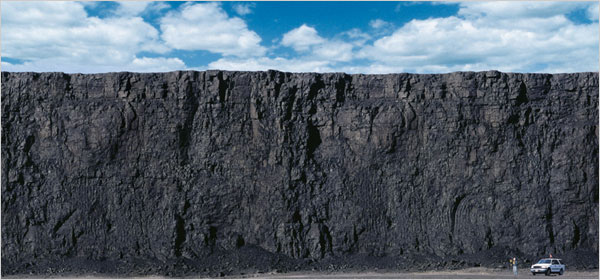Originally posted at The Great Energy Challenge blog
Anytime coal’s cost to America is discussed, the coal industry reflexively talks about what an economic lifeline it is for the states in which it operates. Headwaters Economics, a Bozeman-based think tank focusing on natural resource issues, has a solid new study that’s getting national attention for undercutting those claims. For instance, the Headwaters study finds that “[f]ossil fuel production has not insulated energy-producing states from fiscal crisis,” that “[f]ossil fuel extraction has a limited influence at the state level on economic indicators such as GDP by state, personal income, and employment,” and that “[t]he volatility of fossil fuel markets poses obstacles to the stability and long-term security of economic growth in energy-producing regions.”
This is a problem for the coal industry, which spends heavily to construct a fantasy world in which it’s a “clean” industry to which we should feel grateful, a vital supplier of our power, and an economic lifeline to host communities.
But in the real world, coal’s case is even weaker than the Headwaters study shows. The work of Professor Michael Hendryx of West Virginia University goes even further. His work has looked at the costs of coal mining to the Appalachian communities that host it.
In light of the House of Representatives’ aggressive efforts to eliminate already-loose controls over the coal industry’s egregious practices – blowing the tops off mountains and violating the Clean Water Act – we interviewed Hendryx and found his views especially timely and powerful. The highlights:
- Coal “mining is a loser economically, environmentally, and in terms of public health.” Hendryx has found that the heaviest coal-mining regions of Appalachia are worse off in just about every way compared to neighboring regions, similar in every other way except that they are below median in terms of coal production. The above-median coal-mining communities of Appalachia are also far worse off compared to the rest of the country. In making his calculations, Hendryx looked at a range of indicators, including health, education, poverty, environmental conditions, unemployment, and mortality rates. All told, Hendryx’s found that mountaintop removal mining’s economic cost to Appalachian communities totaled roughly $42 billion per year in lost health and lives.
- The coal industry rhetoric that mining is important for jobs is simply not true. In fact, Hendryx’s research has found that Appalachian counties with the heaviest concentration of coal mining have the worst unemployment and the worst economic conditions in the region. According to Hendryx, the coal industry mantra that mining creates “jobs, jobs, jobs,” is a total myth – as is the false dichotomy between jobs and the environment that coal apologists suggest. As Hendryx bluntly puts it, “There still is a very strong presumption in the state that mining is important to jobs. I just shake my head that we still don’t understand that it’s not.”
- Despite industry propaganda to the contrary, coal is neither cheap NOR abundant. In fact, “They are lying.” According to a recent Harvard study – one on which Professor Hendryx was a co-author – the full “lifecycle cost” of coal to the U.S. public is actually upwards of $500 billion a year. As for the “abundant” argument, Hendryx concludes that the industry is simply “lying” when it claims we have 200 years of coal left. To the contrary, Hendryx points out, US Geological Service and other analyses indicate that coal production is likely to peak in as few as 10 years, and might have already have peaked in Appalachia.
- The concept that coal can be “clean” is “beyond absurd.” The idea that coal can be “clean,” whether on the combustion side or on the production side, and that we should invest billions of dollars in trying to achieve it is utterly ridiculous and a complete waste of money. According to Hendryx, “We need to get serious, stop wasting billions of dollars a year on the beyond absurd concept of clean coal.”
Michael Hendryx is a national expert on coal’s real-world impacts. Unlike the front group operatives that the coal industry underwrites to move its claims in the court of public opinion, it’s reasonable to assume that Professor Hendryx doesn’t make any more money if his research finds that coal’s arguments bear out in the real world – or not. That means his conclusions are worth repeating: that coal’s “clean” claims are absurd; that coal spokespeople claiming its an abundant fuel supply are “simply lying;” and that the technology is an economic “loser.”
Coal-funded front group people give two variations on a standard line: 1) that government shouldn’t “favor one energy sector over another;” and 2) that government “shouldn’t pick winners and losers.” All of that sounds nice. However, given how much welfare politicians have been showering on the coal industry for nearly a century, it’s clear that government has been favoring some forms of energy for a long time now. And it’s increasingly clear that government has been favoring a loser.
Subscribe to our newsletter
Stay up to date with DeSmog news and alerts








